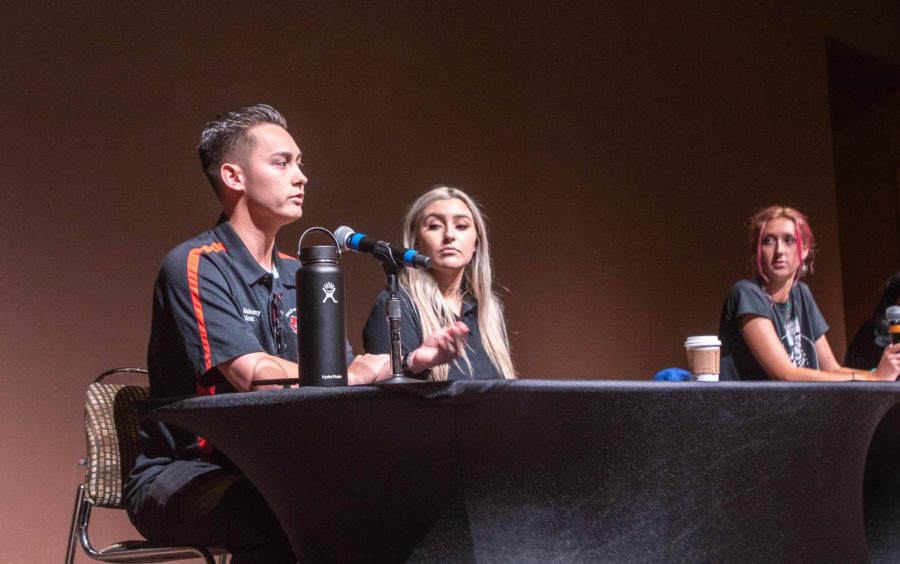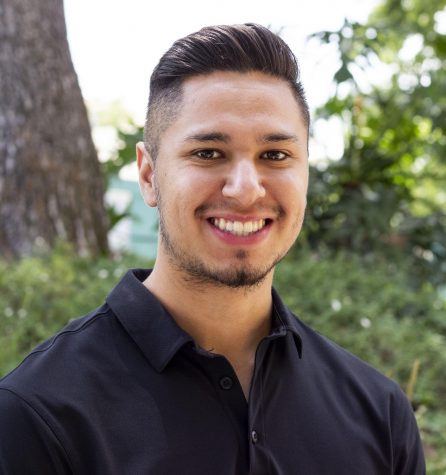Throughout the media Greek organizations across the nation have been scrutinized over the last few decades based on their actions. Two programs here at San Diego State have taken the initiative to inform its members on how to educate, prevent and discuss sexual assaults that happen here on campus.
The programs, FratMANners, Fraternity Men Against Negative Environments and Rape Situations, and SISSTER, Sororities Invested in Survivor Support, Training and Ending Rape Culture, allow Greek members to enroll in peer-educated courses that increase awareness about prevention, intervention and support.
The programs are run by university staff members Stephanie Waits Galia and Samantha Greeney who help the Greek community talk through these topics and orchestrate events and presentations in both formal and informal settings.
Unlike similar programs around campus that usually take the form of smaller events, FratMANers and SISSTER and both courses.
The first course members can take is a trainee program which forces new members to have serious discussions about sexual assault. From there, new members dedicate the following 16 weeks to preparing a presentation given to various campus groups where they aim to answer questions on the issue and guide any misconceptions.
After students have taken this course, they are able to enroll in the next course which deems them as “active members.” This course has an executive board and holds weekly meetings where they give presentations to many campus communities such as athletics, ROTC and faculty. All new members of Greek organizations are required to attend such presentations.
Finance junior and SISSTER member Alexis Jones said she found the discussions she had between fraternity and sorority members in the program helped to broaden her perspective on the issue.
“Being able to learn about sexual assault prevention and helping survivors is extremely beneficial as well as collaborating with FratMANners on these issues and being able to hear first hand their perspectives,” Jones said.
President of FratMANners marketing senior Nicholas Wohlman said he believes the fraternity member’s presentation is different than any he has heard of before, as the conversation frames sexual assault as a men’s issue as opposed to a womans one.
“The reason why it is different than other sexual violence presentations is we give it from a male’s perspective because a lot of sexual violence presentations are based on what women can do to prevent sexual violence and protect themselves and we see it as that is not how it should be,” Wohlman said. “You should not have to go out at night and think about those things, it should not be an issue.”
With this, Wohlman said men are forced to hold themselves and their friends accountable for their actions.
“So how can us as men prevent that?” Wohlman asked. “How can we look out for warning signs? How can we not be bystanders? How can we actually intervene in situations like that?”
While FratMANners was introduced to campus in 2007, the organization’s collaboration with other campus operations such as Interfraternity Council Recruitment, Student Ability Success Center and Counselling and Psychological Services has strengthened their campus presence.
Wohlman said he got involved with the organization early on in his college career after a situation involving sexual violence hit close to home.
“At the end of my freshman year, one of my good friends came up to me – she was in a sorority – and she told me that she was sexually assaulted at a party on campus and I didn’t know what to say to her,” Wohlman said.
He said it was this experience that made him realize how important it is to be well versed in counseling survivors.
“After that day, I made it a mission of mine to always be ready for those conversations if it comes up and never been in a situation where I can’t help someone with what they’re going through,” Wohlman said.
SISSTER is a newer organization on campus led by sorority women, for sorority women in order to become leaders in sexual violence awareness and prevention around campus. The women in the course meet weekly with the members of FratMANners where they discuss future events and current issues that relate to the topics of the course. In recent months, the organizations’ conversations have tackled issues such as the confirmation of Supreme Court Justice Brett Kavanaugh and the #MeToo Movement.
Psychology senior and SISSTER President Kylie Vinther said these organizations provided her with a safe space to turn on campus.
“I came into college extremely nervous about joining the Greek community because someone very close to me had disclosed that they had been sexually assaulted at their university, and told me they didn’t want me to join Greek life for that reason,” Vinther said. “When I joined Kappa Delta as a freshman, I always heard older members talking about SISSTER and I knew that this organization was special.”
She said the number one concept their curriculum teaches is that when an assault occurs, it is never the survivor’s fault. She said SISSTER also puts emphasis on the importance of affirmative verbal consent and how they promote it throughout Greek life.
“This means that, instead of the absence of a ‘no,’ there must be an enthusiastic, verbal ‘yes’ for all sexual acts,” Vinther said. “It doesn’t matter if the survivor was drunk or if they were dressed provocatively, if there isn’t a yes given by someone who is coherent enough to give that yes, then it is not consent.”.
Some of the past events the organizations of held include Spike Balls Not Drinks, The Green Dot Project, Every Kiss Begins with Consent and #NotSilentBecause. The Green Dot Project is one of the organizations annual events where the group asks students to place either red or green stickers on a campus map, red showing places they have seen sexual misconduct and green showing places they have seen prevention. The goal of this project is to begin conversations on campus about what can be done to stop sexually violent behavior.
One of the other main goals of the programs is to prevent the normalization of sexual violence by working to eradicate misconceptions, business marketing junior and FratMANners member Alex Franks said.
“What I believe to be the most important lesson I have learned through my time in FratMANners is the value of a friend to a survivor of sexual assault,” Franks said. “Sexual assault is not a physical discomfort that comes and goes, it is also an assault on a person’s recognition of their self-worth.”
He said this is especially important when considering how psychologically debilitating an assault can be to a person.
“In the aftermath of an assault, survivors can often fall into depression, lose a sense of their individuality and lose self-esteem,” Franks said. “A friend has the ability to reassure a survivor of the fact that they are loved, appreciated, valued, respected and cared for.”
While there is still much growth that can be done on issues as such, campus groups like FratMANners and SISSTER have been proactive in working to make sexually violent actions unacceptable in the Greek community.
“I think SDSU is way ahead of the game when it comes to addressing sexual assault in the Greek community,” Vinther said. “While there’s always more that can be done, programs like SISSTER and FratMANers are effective and important.”
Vinther said part of the organizations’ hopes are to inspire other universities to address the issue of sexual assault within their Greek communities.
“I definitely believe we are much more equipped to confront these issues than other universities, and hopefully we can spread our programs to other universities in the future,” she said.
Greek members can apply for the courses preceding the semester they intend to enroll through SDSU’s Greek Life page on the Student Affairs website or find out more information through Well-Being and Health Promotion.





